Storing coffee properly is essential for preserving its rich flavors and aromas. If you’re a coffee lover, you might be wondering whether it’s a good idea to keep your coffee in the refrigerator. In this article, we’ll explore the ins and outs of coffee storage, including tips and tricks for maintaining its freshness, especially when using the fridge.
Understanding how to store coffee correctly can elevate your brewing experience at home, helping you enjoy a café-quality cup every time. So, let’s dive into the best practices for keeping your coffee beans fresh in the refrigerator and the potential pitfalls to watch out for.
- Discover how temperature and humidity affect coffee freshness.
- Learn the pros and cons of refrigerator storage for your coffee.
- Get practical tips on the best storage containers and arrangements.
Basic Knowledge for Keeping Coffee Beans Fresh
What Causes Coffee Beans to Deteriorate?
To truly appreciate the delightful flavors of your coffee, it’s crucial to understand what can lead to the deterioration of coffee beans. Several factors come into play, and being aware of these can help you maintain the quality of your brew.
First off, exposure to air is a major culprit in coffee bean degradation. When coffee beans come into contact with oxygen, they begin to oxidize, which can lead to a stale taste. Additionally, light can also play a significant role. If your beans are exposed to light, especially sunlight, the flavors can degrade rapidly.
Another factor is moisture. Coffee beans are hygroscopic, meaning they absorb moisture from the environment. Storing them in a humid setting, like a refrigerator, can cause them to lose their essential oils and flavors. Lastly, heat can accelerate the aging process of coffee, making it essential to keep your beans in a cool, stable environment.
To summarize, here are the key factors that can compromise the quality of your coffee beans:
- Air exposure leading to oxidation
- Light exposure degrading flavors
- Moisture absorption affecting essential oils
- Heat accelerating aging
Key Points for Maintaining Freshness
Now that we’ve covered the main causes of deterioration, let’s discuss some essential tips to keep your coffee beans fresh for as long as possible. The first step is to choose the right storage container. Opt for an airtight container that blocks light, like a dark glass jar or a ceramic container with a tight seal. This helps minimize air exposure and light degradation.
Another important point is to avoid storing coffee beans in the refrigerator if possible. While it might seem like a good idea, the fluctuating temperatures and humidity can do more harm than good. Instead, consider finding a cool, dark place in your kitchen, like a pantry or a cupboard, for optimal storage.
By following these guidelines, you can ensure that your coffee beans stay fresh and flavorful, allowing you to enjoy the best possible cup every time.
- Use airtight containers to protect from air and light
- Store in a cool, dark place away from humidity
- Avoid the refrigerator to maintain stable temperatures
Benefits of Storing Coffee in the Refrigerator
Importance of Temperature Control in the Refrigerator
While we’ve talked about the potential downsides of refrigerating coffee, there are some benefits worth discussing. One of the key advantages is temperature control. The refrigerator maintains a consistently cool environment, which can help slow down the aging process of your coffee beans. This is important because heat can accelerate the deterioration of flavors and aromas, resulting in a less enjoyable cup of coffee.
If you live in a warm climate or your kitchen tends to heat up, the refrigerator can be a great option to keep your coffee beans cooler. Just make sure to take precautions to protect them from moisture and odors that can also be present in the fridge. Properly sealing your coffee in an airtight container can help mitigate these issues while still taking advantage of the cooler temperature.
In addition, if you’ve opened a bag of coffee and won’t finish it quickly, refrigerating it can help preserve its freshness for a longer period. Just remember to bring the coffee back to room temperature before brewing, as brewing cold coffee beans can affect the extraction process.
- Refrigerators provide a consistently cool environment.
- Cooler temperatures can slow down flavor deterioration.
- Proper sealing is essential to protect from moisture and odors.
Advantages of Humidity Control
Another significant benefit of using the refrigerator for coffee storage is humidity control. Coffee beans are sensitive to moisture, and high humidity can lead to an unwanted loss of flavor. The refrigerator is generally less humid than many kitchen environments, especially during cooking or in areas with high humidity.
By storing your coffee in the refrigerator, you can minimize the risk of moisture absorption, which helps maintain the essential oils that contribute to the rich flavors of your brew. However, it’s crucial to ensure that your coffee is stored in a well-sealed, airtight container to prevent any moisture from entering.
In summary, while there are some risks associated with refrigerating coffee, the advantages of temperature and humidity control can make it a viable option for certain situations. Just be mindful of how you store your coffee to maximize freshness and flavor.

If you found the information on temperature and humidity control in coffee storage intriguing, you might also want to explore this article: How to Keep Your Green Coffee Beans Fresh. It delves into effective methods for preserving the freshness of your coffee beans right from the start, ensuring you get the most out of your brewing experience.
- Refrigerators typically have lower humidity levels.
- Proper storage prevents moisture absorption.
- Airtight containers are essential for maintaining flavor.
Drawbacks to Be Aware of When Storing in the Refrigerator
Impact of Refrigerator Odors
While the refrigerator can offer some benefits for coffee storage, it’s important to be aware of the potential downsides as well. One major issue is the presence of odors from other foods in the fridge. Coffee is known for its ability to absorb flavors and aromas from its surroundings, which means that if your coffee beans are not stored properly, they can pick up unwanted smells. This can lead to a less than pleasant brewing experience, as the flavors of your coffee may become muddled with those of other items in your refrigerator.
To mitigate this risk, it’s essential to use an airtight container that not only seals out air but also keeps out those pesky odors. By doing this, you can help ensure that the unique flavors of your coffee shine through without interference from other foods.
- Coffee can absorb odors from the refrigerator
- Proper sealing is necessary to maintain flavor integrity
- Airtight containers can help prevent flavor interference
Risk of Deterioration Due to Condensation
Another drawback of storing coffee in the refrigerator is the risk of condensation. When you take your coffee out of the fridge, the temperature change can cause moisture to form inside the container, especially if it’s not completely airtight. This moisture can lead to the deterioration of the coffee beans, causing them to lose their essential oils and flavors.
It’s important to be cautious with this condensation issue. If you frequently open and close the container, you’re increasing the chances of moisture exposure. Ideally, you want to minimize how often you access the coffee stored in the fridge. If you’re storing a larger quantity, consider dividing it into smaller portions, so you only expose what you need at a time.
Furthermore, if you decide to refrigerate your coffee beans, remember to let them come to room temperature before brewing. This helps prevent any further condensation and ensures a better extraction during brewing.

If you’re interested in enhancing your coffee storage methods, you might find the article “How to Choose the Best Airtight Containers: Secrets to Keeping Your Food Fresh” particularly useful. It delves into selecting the right containers to maintain the freshness and flavor of your coffee, ensuring that you can fully enjoy your brewing experience without interference from external odors.
- Condensation can occur when coffee is removed from the fridge
- Moisture can degrade the quality of coffee beans
- Minimize exposure by storing in smaller portions
Practical Suggestions for Coffee Storage
Recommended Storage Containers
When it comes to keeping your coffee fresh, the right storage container makes all the difference. While we discussed the importance of airtight containers earlier, let’s dive deeper into the types that work best for coffee lovers. A good option is a dark glass jar, which protects your beans from light exposure while also sealing in freshness. Alternatively, ceramic containers with a tight-fitting lid can create an airtight environment, reducing the risk of oxidation.
Another practical recommendation is to look for containers specifically designed for coffee storage. These often come with features that regulate air and humidity levels, making them ideal for preserving your coffee beans. Additionally, avoid transparent containers, as they expose your beans to light, which can deteriorate flavor over time.
When selecting your container, consider the size as well. It’s best to choose a container that fits the amount of coffee you typically consume within a few weeks. This helps minimize the number of times you have to open it, reducing air exposure that can compromise the beans’ freshness.
In summary, here are the key takeaways for choosing the right storage containers for your coffee:
- Opt for dark glass jars or ceramic containers with tight seals
- Consider containers designed specifically for coffee storage
- Choose sizes that match your consumption frequency to reduce exposure
Proper Arrangement Inside the Refrigerator
If you’ve decided to store your coffee in the refrigerator, the way you arrange your containers can impact its freshness. First, place your airtight containers on a shelf that maintains a stable temperature. Avoid the door, as it experiences frequent temperature fluctuations, which can be detrimental to your coffee’s quality.
Next, consider the placement of your coffee relative to other items in the fridge. Keep it away from strong-smelling foods, as coffee beans can easily absorb those odors, impacting the flavor. It’s also wise to avoid storing your coffee near items that can release moisture, such as fruits and vegetables. Ensuring your coffee stays dry and odor-free is key to preserving its rich flavors.
By following these suggestions, you can create an effective storage system for your coffee in the refrigerator. Remember, the goal is to maintain the integrity of the flavors while minimizing exposure to external elements that could compromise your brewing experience.
- Store coffee on stable shelves, avoiding the door
- Keep coffee away from strong-smelling foods
- Prevent moisture exposure by placing it away from fruits and vegetables
Summary
In conclusion, storing coffee in the refrigerator has its pros and cons that every coffee enthusiast should consider. While the fridge can provide a cool environment that slows down flavor deterioration, it also poses risks such as moisture absorption and odor interference from other foods. Therefore, it’s essential to use airtight containers and be mindful of how you arrange your coffee to maintain its freshness and rich flavors.
To recap, here are some key points to remember when storing your coffee:
- Opt for airtight containers to protect your coffee from air and odors.
- Store coffee in a cool, dark place, avoiding the refrigerator if possible.
- If using the refrigerator, ensure proper sealing and placement away from strong-smelling foods.
We’d love to hear your thoughts! Do you have any personal tips or experiences with coffee storage? Please share in the comments below!









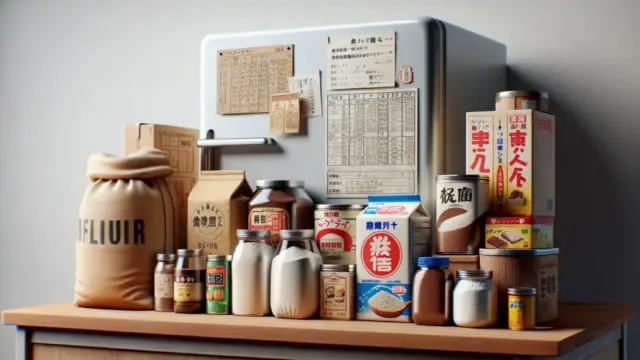






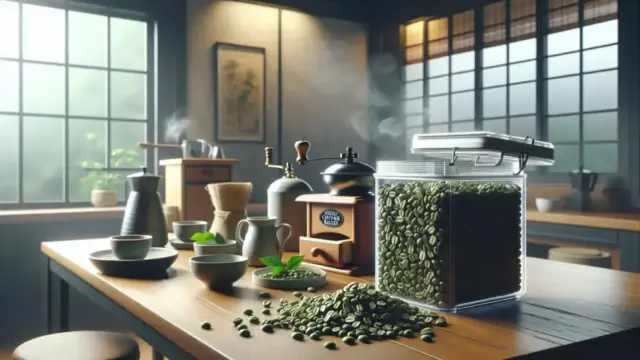




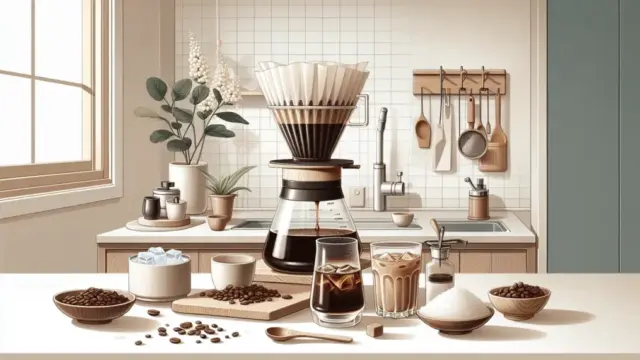


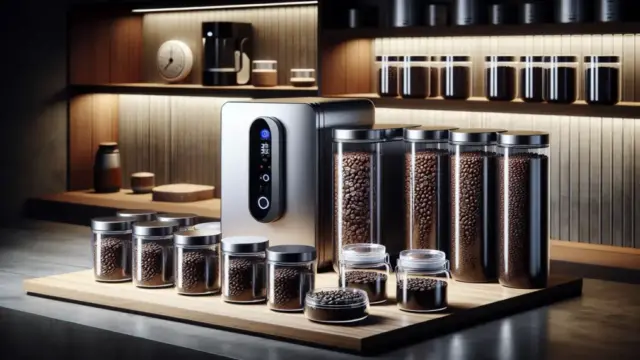
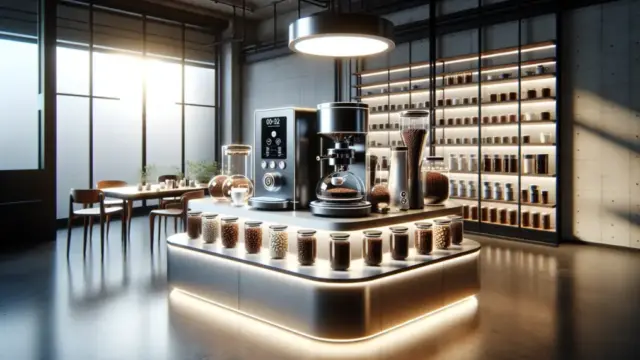














Comment